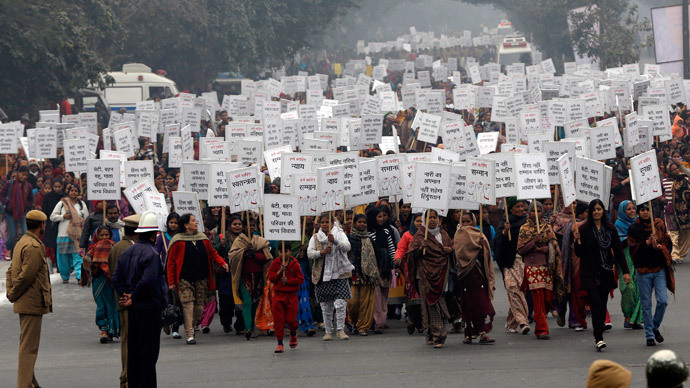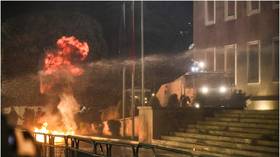Delhi rape documentary being removed from YouTube, at India govt request

After banning the broadcast of a controversial film about the gang rape and murder of a woman in Delhi in 2012, India has asked YouTube to remove all the video site’s links on the subject. It objects to the rapist’s revelations, which blame the woman.
"We just forwarded the court order and asked them [YouTube] to comply," an official at the Ministry of Communications and Information Technology told Reuters on Thursday, commenting on the new film.
In “India’s daughter”, director Leslee Udwin documents a crime committed in December 2012 in Delhi, when a gang of six rapists abused and killed 23-year-old medical student Jyoti Singh on a bus. It prompted a public outcry in India, where massive protests took place and millions of people called for a change in the justice system. The outrage led to a bill proposing 30 years’ jail for rapists and possible chemical castration.
The British documentary features an interview with Mukesh Singh, one of four men sentenced to death, who said the victim was culpable for the rape. "A girl is far more responsible for rape than a boy," he said. “She should just be silent and allow the rape.”
Social media slammed Singh's comments, which also triggered a debate on gender inequality in India, Asia's third-largest economy and the world’s largest democracy.
On Wednesday, BBC aired the film in the UK, where about 300,000 tuned in. It was also possible to view it later on platforms such as YouTube.
"We believe that access to information is the foundation of a free society," said a spokeswoman for Google, which owns the video-sharing site YouTube, as cited by Reuters. "We continue to remove content that is illegal or violates our community guidelines, once notified."
Dear Indian govt, Ban this rapist mentality of people like those rapists and their lawyers..not the documentary. #IndiasDaughter
— Siddharth Rajhans (@i_am_sidraj) March 5, 2015
YouTube didn’t confirm whether it had received the instruction from the government, asking to remove the “very sensitive” content from the website, according to the Indian Zee News channel. However, the documentary is currently being pulled from YouTube.
The video platform saw a heated debate in its comments section, as some users furiously defended India and its culture, while others stood up for not banning the film’s airing.
“Factual documentary, without unnecessary commentary. Very well produced, capturing the indignation of the man on the street at delayed justice and the impunity with which men rape women,” a YouTube user commented on the video.
As the govt is on a banning spree, will someone ensure that this man is banned from practicing law? #IndiasDaughterpic.twitter.com/hitskeAr3u
— Rahul Bajaj (@rahulbajaj) March 5, 2015
Indian authorities banned the documentary, saying that Udwin had failed to get the requisite filming permission. India's Home Minister Rajnath Singh said in parliament that the documentary was a "conspiracy to defame India," as cited by the International Business Times. He added "all options are open,” speaking of acting against the BBC for broadcasting the banned film.
In a statement on Wednesday, Delhi Police said it feared the film's screening had "created a situation of tension and fear amongst women in the society" and a ban on the documentary was crucial "in the interest of justice and maintenance of public order," as reported by AP.
"Everyone should watch the film. If a man can speak like that in jail, imagine what he would say if he was walking free," the father of the murdered woman said in an interview with NDTV on Thursday.
"The documentary exposes what is happening," he added.












